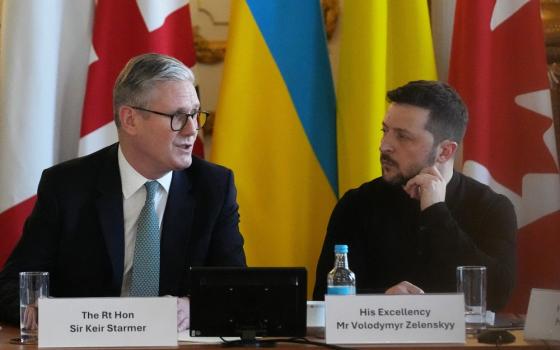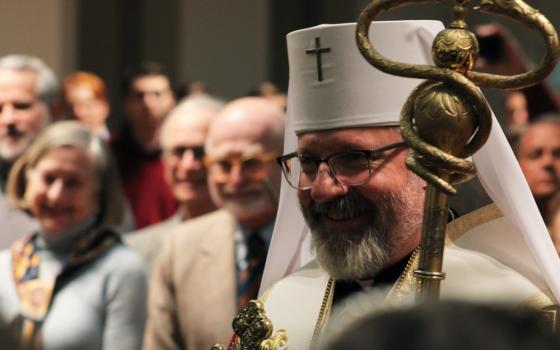A local resident gestures outside a residential building in Kramatorsk, Ukraine, Feb. 2, 2022, which was destroyed by a Russian missile strike. (OSV News/Reuters/Vyacheslav Madiyevskyy)
Next week marks the one-year anniversary of the latest Russian invasion of Ukraine. This time last year, we were all worried that Russian troops would quickly move on Kyiv, crush the democratically elected government, and then continue its historic efforts to suppress Ukraine's culture and national identity. Instead, the Ukrainian resistance thwarted the attacks on Kyiv, reclaimed the second largest city, Kharkiv, and has fought the Russians to a stalemate in the Donbas region.
The Russian attack last year continued an invasion that began in 2014 when Russia illegally annexed Crimea and took control over part of the Donbas region along Ukraine's eastern border with Russia. In some sense, it is a continuation of Russian efforts to stamp out Ukrainian culture seen during the forced collectivization of agriculture in the late 1920s and early 1930s, killing millions, mostly from starvation.
Advertisement
The suppression of the Ukrainian Catholic Church by the Soviets throughout the 70-year tyranny of Communism, and attempts to force the Ukrainian Orthodox Church into affiliation with its Moscow-based, Russian cousin, were also part of the Russian assault on Ukrainian culture. Ukrainians remember, however, that it was the baptism of Prince Volodymyr of Kyiv, who converted to Christianity in the 10th century, that eventually brought the Christian faith to Moscow, not the other way round. Baptisms in the Dnieper River preceded those in the Moscow River by about 200 years.
The heroic defiance of the Ukrainian military and its people this past year cannot allow us to ignore the human tragedy that is unfolding before our eyes, even though casualty estimates are difficult to make while the fighting is ongoing. According to The New York Times, Russia is fast approaching 200,000 casualties in this unjust war, and last month, the Norwegian Defense Minister estimated Ukraine's military had sustained 100,000 casualties and that there had been approximately 30,000 civilian deaths. The United Kingdom's most recent intelligence update indicated that Russian casualties had grown significantly in recent weeks as poorly trained soldiers, often recently released from prison, are used as cannon fodder, trying to clear a path for more seasoned troops. It is a barbaric, not to say surprising, tactic.
Archbishop Borys Gudziak of the Ukrainian Catholic Archeparchy of Philadelphia speaks during a Nov. 16, 2022, session of the fall general assembly of the U.S. Conference of Catholic Bishops in Baltimore. (CNS/Bob Roller)
The human suffering is not measured only in deaths. As my colleague Christopher White reported in December, thousands of children have been forcibly removed to Russia for "re-education," tens of thousands have been left homeless, and many cities saw their entire infrastructure bombed into smithereens. Even when the killing stops, the scars will continue.
Last November, at the U.S. bishops' conference meeting in Baltimore, Archbishop Borys Gudziak of the Archeparchy of Philadelphia spoke to his brother bishops, thanking them for their support and asking for their prayers. As I noted at the time, you could hear a pin drop in the room while Gudziak spoke. His talk was the highlight of the three-day plenary meeting.
Gudziak distributed a booklet, Ukraina Redux: On Statehood and National Identity by Paul Robert Magocsi, a professor of history and political science at the University of Toronto, and asked the bishops to read it. I hope they did. It contains a concise history of the various persecutions to which Ukraine has been subjected, and also examines the changing boundaries of the country. More importantly, Magocsi explains the efforts made since independence was re-gained in 1991 to understand "Ukrainian" as a civic, not an ethnic, label. That is to say, there has been an effort to respect within Ukraine's laws and education systems and even street names, the various ethnic and national minorities within the country and the contributions they have made. Ukraine is not cosmopolitan the way Paris is, but it was moving in a liberal, modern and humane direction when Russian President Vladimir Putin brought hell to its streets and hearths.
Another book I recently read was At the Foot of the Cross: Lessons from Ukraine, John Burger's book-length interview with Archbishop Sviatoslav Shevchuk, the still young major archbishop of Kyiv-Halych, leader of the Ukrainian Greek Catholic Church in Ukraine. Shevchuk sent his priests into the bomb shelters and the subways when the war started.
"The crisis of 2022 contained parallels to the times of the illegal existence of the Ukrainian Greek Catholic Church," Burger writes. "Priests going underground — literally — to serve the Divine Liturgy for a population huddled in dark, makeshift bomb shelters was like the time when priests went to homes at night and Christians gathered in secret and in silence to hear the Word of God preached to them."
During Soviet times, the church was underground metaphorically. Now, in wartime, the metaphor became real. In both eras, the faith was rock solid. Now, the faithful watched a daily video from Shevchuk. Then they listened to Vatican Radio. Shevchuk's memories of growing up when the Catholic faith was persecuted, and how the people kept the faith alive and their relationship with God central to their lives, are fascinating and challenging. What are we, who are not persecuted, willing to give up for the faith?
Burger asked Shevchuk about apologists for Russia who see Putin's regime as a bulwark against the "decadence, filth, immorality" of the West. Shevchuk's reply should be required reading for those bishops who threw in their lot with Donald Trump in order to get a more conservative Supreme Court.
This grim anniversary is a time for all who care about democracy to campaign for continued support of the brave men and women of Ukraine as they defend their homeland and the principle of self-determination.
"I would not believe that in today's circumstances, a state, by its paternalistic protection of the Church, is able to foster Christian values," Shevchuk said. "The reality is that very often the state will instrumentalize religion and the Christian Church for its own political or geopolitical proposals. And that is exactly what is happening in Russia."
This grim anniversary is a time for all who care about democracy to campaign for continued support of the brave men and women of Ukraine as they defend their homeland and the principle of self-determination. It is also a time to look beyond the lofty ideals and the statistics and reflect upon the horror this war has occasioned, the families hollowed out by death, the towns and cities that have been destroyed, the dreams turned to dust by war crimes. It is a time to pray that God will bring victory to the soldiers of Ukraine and send confusion upon her enemies. It is a time to pray that peace will come to these bloodlands, a peace that offers no reward to the Russian criminals who instigated this conflict and that respects the dignity and freedom of the Ukrainian people.







